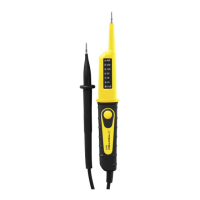EN 3
voltage detector BE17
• For technical reasons, the device must not be operated for
10minutes after each voltage detection. The device may
only be used again for the next voltage detection after the
rest period of 10minutes has elapsed.
• After each use, screw the supplied test probe protectors
onto the two test probes to prevent injuries.
• Depending on the internal impedance of the voltage
detector, the device may either indicate "operating voltage
present" or "operating voltage not present" if an
interference voltage is present.
• A voltage detector with a relatively low internal impedance
will not indicate all interference voltages with an initial
value above ELV, compared to the reference value of
100kΩ. Upon contact with the system parts to be checked,
the voltage detector may temporarily reduce the
interference voltages by discharging to a level below ELV;
however, after the voltage detector has been removed, the
interference voltage will assume its original value again.
• If the "voltage present" indication does not appear, it is
highly recommended that you insert the earthing device
before starting work.
• A voltage detector with a relatively high internal impedance
will not clearly indicate "operating voltage not present" if
an interference voltage is present, compared to the
reference value of 100kΩ.
• If the "voltage present" indication appears for a part that is
considered to be disconnected from the system, it is highly
recommended that you take additional measures (e.g.
using an additional suitable voltage detector, visual
inspection of the disconnection point in the electric
network, etc.) to check the "operating voltage not present"
state of the system part to be checked, and to make sure
that the voltage indicated by the voltage detector is an
interference voltage.
• A voltage detector indicating two internal impedance
values has passed the design test for handling interference
voltages and– within the technical limits– is able to
differentiate between operating voltage and interference
voltage, and to directly or indirectly indicate the existing
type of voltage.
• Observe the storage and operating conditions as given in
the Technical data chapter.
Intended use
Only use the device to indicate voltage ranges between 12 and
400VDC or 12 and 400VAC whilst adhering to the technical
data. The device may be used in facilities of overvoltage
category3 (CATIII= domestic installations).
To use the device for its intended use, only use accessories and
spare parts which have been approved by Trotec.
Improper use
Do not use the device in potentially explosive atmospheres,
when wet or very humid.
Unauthorized modifications of the device are forbidden.
Personnel qualifications
People who use this device must:
• master the 5safety rules (1De-energise, 2Secure against
restart, 3Verify de-energised state (bipolar), 4Earth and
short-circuit, 5Cover neighbouring live parts).
• use the voltage detector following safe working
procedures.
• be aware of the dangers that occur when working with
electric devices in damp areas.
• take measures to protect themselves from direct contact
with live parts.
• have read and understood the operating manual, especially
the Safety chapter.
Electrically skilled person
Electrically skilled personnel must be able to read and
understand electric circuit diagrams, to put electrical systems
into service and to maintain them, to wire control cabinets, to
ensure the functionality of electrical components and to identify
possible hazards from electrical and electronic systems.

